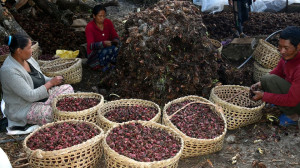Money
Lessons learnt?
This week, the government imposed restrictions on non-governmental agencies and private individuals from dispensing relief materials to those affected by the floods that have inundated large ports of the Tarai without coordination with the authorities.
Binod Ghimire
This week, the government imposed restrictions on non-governmental agencies and private individuals from dispensing relief materials to those affected by the floods that have inundated large ports of the Tarai without coordination with the authorities. This decision came despite the government being flayed for incompetency every time it has sought to regulate the distribution of aid following a disaster. Be it in the aftermath of the massive landslide in Jure, Sindhupalchok, three years ago, or during the devastating earthquakes of 2015, its one-door policy for relief distribution has fared badly. Yet, authorities at the centre are still adamant about controlling the dispensation of relief materials to thousands of victims from the rain-induced disaster which has affected over one-third of the population of the country.
In August, 2014, a massive landslip in Jure—a settlement that hugged the Sunkoshi River and the Araniko Highway—killed 156 people and uprooted the entire community. When government agencies failed to provide timely support to the displaced, private citizens began collecting relief materials, both cash and in kind. However, the government announced a mandatory provision that the relief should be channelled through the local authorities. While there is no record of whether the material support handed over actually reached those in need, the money deposited into the accounts of the local administrative body never reached the displaced.
Three years on, the victims of the landslide are still waiting for the pledged relief. Rs 22.5 million collected from the general public still languishes in the bank account of the District Administration Office, Sindhupalchowk. Chief District Officer Antar Bahadur Silwal told the Post that the money couldn’t reach the targeted people as there has been no agreement in developing a modality for distribution.
The story repeated itself in the aftermath of the devastating twin earthquakes of 2015, as government again tried to centralise the relief distribution. Tonnes of rice donated by Bangladesh and other countries are still stored in the go-downs of the Food Corporation, while medicine worth millions of rupees expired either at the Tribhuvan International Airport or the customs at Birgunj. Over two billion rupees collected for earthquake victims remained in the account of the Prime Minister’s Disaster Relief Fund until earlier this week. On Wednesday, the government decided to release half of the amount to the flood victims in the Tarai.
Even though previous disasters have showcased how centralising relief attempts can be ineffective, the government is yet to develop a more efficient modality of responding to them. On Monday, the government imposed restrictions on non-governmental actors from dispensing support without coordination with the authorities and formed a Relief Collection Coordination Committee under Joint Secretary of the Ministry of Home Affairs Kedar Neupane with a mandate to manage all relief efforts. The government maintains that there are chances of uneven distribution, if relief materials are not channelled through concerned authorities.
Anyone wanting to support the victims of floods in kind will have to submit them either at Thapathali-based Nepal Food Corporation or at the humanitarian staging area at the Tribhuvan International Airport or deposit cash in the account of the PM’s Disaster Relief Fund. Those NGOs and individuals who want to go to the field will have to acquire a go-ahead from the Chief District Officer of the respective district.
Clarifying that this was not an attempt to monopolise relief distribution, Joint Secretary Neupane said, “It shouldn’t be taken as a restriction from the government. Usually when private individuals go to the field, the relief distribution is clustered around areas accessible by road, while the needy in remote areas are often left unnoticed.” He claimed that District Disaster Relief Committees, led by the respective CDOs, will keep track of the aid distributed in the entire district on a daily basis and the relief will be funnelled accordingly. This, according to Neupane, will avoid duplication in aid distribution in more accessible areas, while many more victims struggle for relief in others.
Currently, local administrative bodies in flood-affected districts have been collecting records of relief distribution at the village level either from the newly-elected representative or from a local all-party mechanism. The local bodies then determine areas the donors need to target. This, however, has only delayed the relief distribution process, as the victims grow increasingly irate waiting for help to arrive.
“The policy is fine, in principle, but it doesn’t work in a country like ours where government agencies are very slow and ineffective,” Naresh Regmi, a student who is currently in Rautahat with relief worth around Rs 2 million, told the Post. He said that though they were lucky to obtain permission from the local authority promptly, many individuals and non-governmental agencies are confused by the lack of coordination and clear direction. “The already complicated situation has been further compounded by the sway local political leaders have on the decisions made,” Regmi said, “With the provincial and federal elections on the horizon, there is a visible tussle between parties to ensure relief reaches their own voter banks first. The situation is far from ideal.”
Leaders from the non-government sector have a similar say. They claim that such one-door policy is effective only if the government mechanism is efficient. “Otherwise relief material will continue to rot in government go-downs while people suffer, as they did in Jure or in the aftermath of the earthquakes,” said Jit Ram Lama, the treasurer of the NGO Federation Nepal, an umbrella body of NGOs in the country. The issue has now found a tentative resolution with the Supreme Court passing a verdict on Friday that a one-door policy was not suitable given the scale of the disaster. How that will play out in the coming days and weeks, however, remains to be seen.




 5.27°C Kathmandu
5.27°C Kathmandu















